Experts say alcohol culture ballooned during pandemic, led to increases in problematic drinking
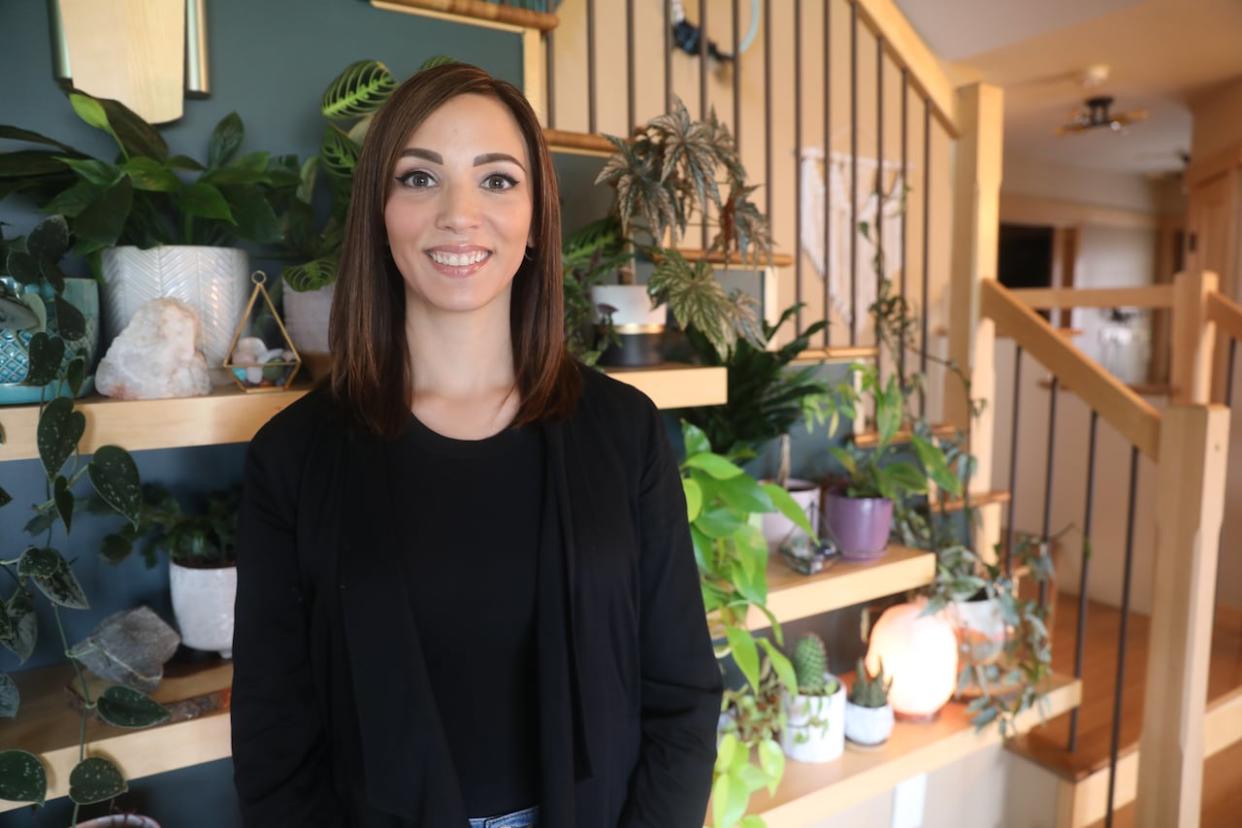
The COVID-19 pandemic was a time of unknowns. It brought confusion, anxiety, fear, boredom, isolation and a lack of structure.
Experts believe this perfect storm led to a widespread increase in problematic drinking and alcoholism.
Brit Chevrier of Bethune, Sask. — nearly 60 kilometres northwest of Regina — found herself drinking more alcohol during the pandemic.
"I had always used alcohol as my primary coping mechanism," said Chevrier.
Chevrier considered herself to be a "grey area drinker." She said this is typically a person who has a career and family, is financially stable and does not seem from their outside appearance to be struggling.
"Over time, their issue with their drinking becomes more prevalent and they start to question whether it's actually serving them or not."
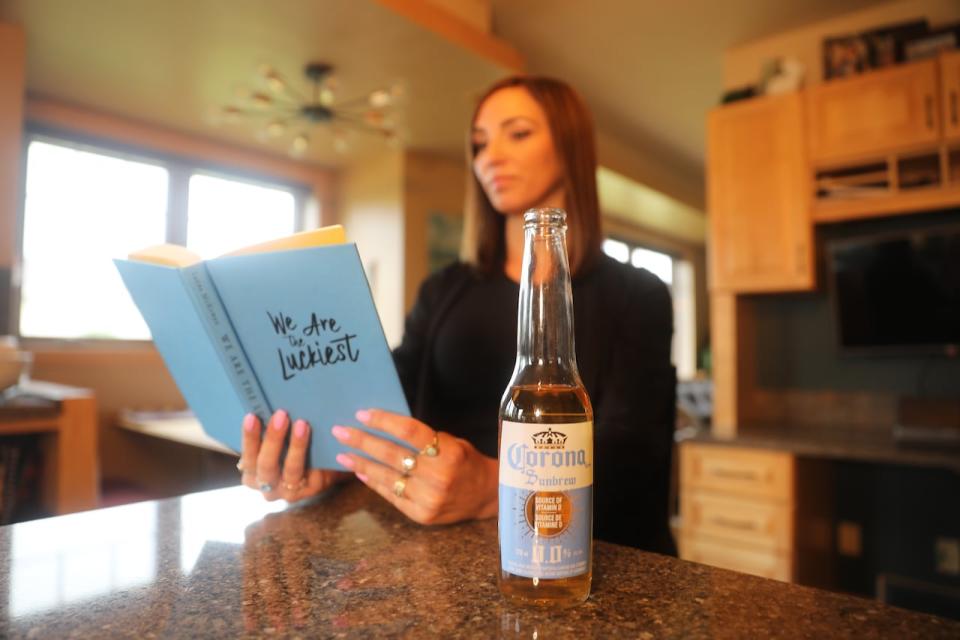
Brit Chevrier says she stopped drinking in 2021 after noticing it had become problematic during the pandemic. Today she enjoys reading books about sobriety and drinking non-alcoholic beverages. (Laura Sciarpelletti/CBC)
Drinking was not serving Chevrier. In fact, drinking amplified her concerns about the pandemic and the future.
"I didn't understand at the time, but a great deal of my anxiety and my stress came from my drinking, as opposed to the limiting belief that I had at the time that my drinking was helping my anxiety issues and helping with my stress."
Coming out as sober
Chevrier said the culture of alcohol was stronger than ever during the pandemic.
Every social media platform featured pandemic drinking games, tips for cocktails to have with friends over Zoom and alcohol-centred creative content and trends. Magazines featured jokes about "wine o'clock" and drinking during Zoom meetings, and featured art depicting people drinking in lockdown.
But ultimately the vacation did end, the isolation did end. And I wonder where that left a lot of people because it certainly had a negative impact on my own drinking." - Brit Chevrier, Sober Flatlander
"I think that we all in unison within our community and within the media and our society started to lean in a little bit more on alcohol for that reason. Because it was a scary time and we didn't really feel like we had many options other than to just hold on and live day by day."
Chevrier said she believes this promotion of drinking was meant to lighten people's mental load and thinks content creators outside of the alcohol industry had good intentions.
"But ultimately the vacation did end, the isolation did end. And I wonder where that left a lot of people because it certainly had a negative impact on my own drinking," she said.
Chevier decided to quit drinking for good in March 2021.
"I often woke up the same way with a wine headache. And I would tell myself, 'OK, I'm not drinking tonight, I'm done.' And it was just starting to feel a bit like Groundhog Day, where every day was exactly the same and I was doing the exact same thing over and over."
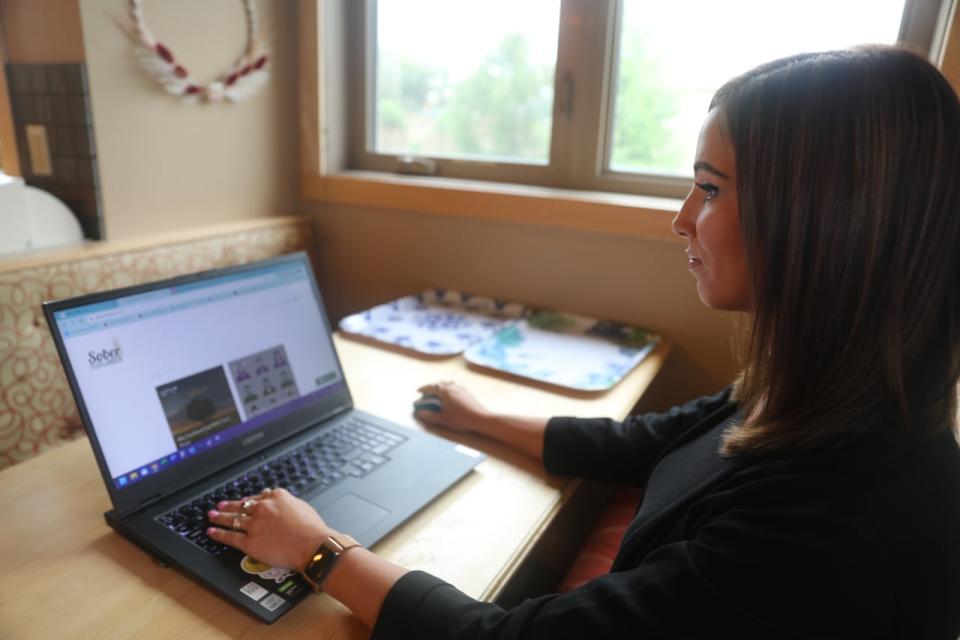
Brit Chevrier started the Sober Flatlander blog six months after getting sober so that she could help others with problematic drinking habits. (Laura Sciarpelletti/CBC)
Six months into her sobriety, Chevrier started the Instagram account and blog Sober Flatlander, which she said helps her with accountability.
She said her husband had some concerns about her putting herself out for the world to see.
"I feel like a lot of people perceive sobriety still in a way that suggests that we kind of have to be hush hush about it or we shouldn't be proud of it because we're admitting that we had a problem with our substance use," said Chevrier.
"I just felt like big alcohol has such a overbearing presence on our society, and one of the best ways that we can start combating that is by fighting fire with fire and spreading awareness about the other side of the coin, which is sobriety."
Increased concerns about alcoholism
Lauren MacDonald, an addiction counselor and mental health therapist in Regina, said the amount of calls she got shot up during the pandemic.
"Normally people don't phone an addiction counselor because then that means they have to admit that they have a problem. So usually they're very far gone. They had a relapse. They need a treatment centre. They need detox. They need something immediate. It's pretty bad," MacDonald said.
But during the pandemic, MacDonald had people calling her who she called "regular Joes."
"I would have people phone and say, 'I'm just curious as to what an addict or an alcoholic would look like.'"

A Regina addiction councellor says some of the people who called her with questions about alcoholism had gone from having two bottles of wine delivered to two boxes every few days during the pandemic. (Justine Bouln//CBC)
MacDonald would then ask the person a series of questions: How much do you drink? What times do you drink?
"They'd say, 'I have to get two bottles of wine delivered every couple of days.' Then all of a sudden it's been a month and their order has become, 'I'm gonna get two boxes of wine every couple of days as opposed to the two bottles.' And it would just increase and increase."
I would have people phone and say, 'I'm just curious as to what an addict or an alcoholic would look like.' - Lauren MacDonald, addiction counsellor and mental health therapist
MacDonald said many people she talked to were giving themselves more allowances around alcohol as the pandemic progressed. That included drinking earlier and earlier, and drinking while doing work at home.
MacDonald said some people would hang up on her once questions led to the realization that they were drinking too much. But others were relieved that they were finally able to tell someone about their problem, and they asked for help.
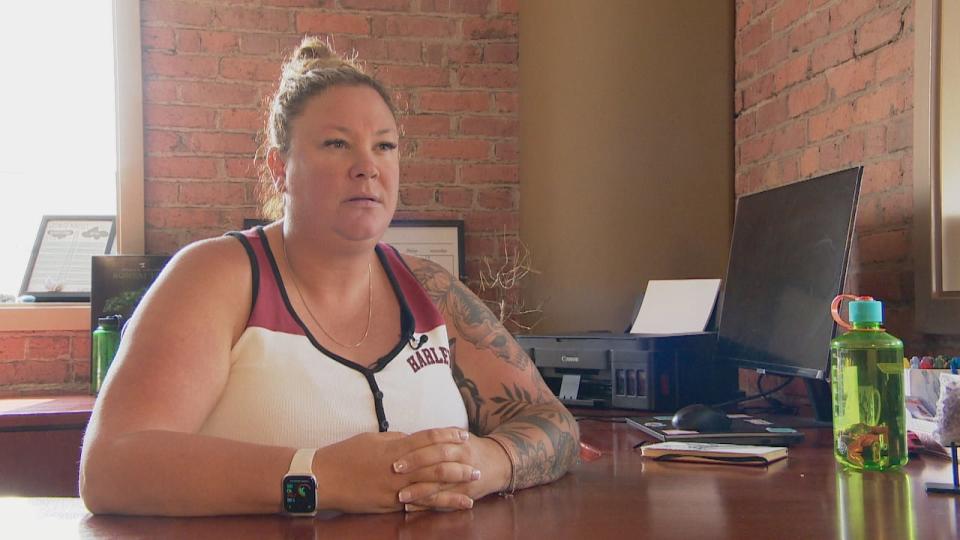
Lauren MacDonald, an addiction councellor at MT Recovery and Family Therapy in Regina, says she got more calls from people who were sober curious than usual during the pandemic. (CBC News)
Today, the addiction councillor said there will be lasting effects from increased drinking during the pandemic.
"Once you start that train, it's very hard to stop," she said, referring to some of her former patients.
"The relapses that happened … there were people that had six months sober. That's very hard to get. And it was gone within an instant. And those people have not come back."
Relaxed alcohol policies
Not only was drinking culture more prevalent online, alcohol was more accessible during the hardest years of the pandemic.
Dr. Tim Naimi, a physician and director of the Canadian Institute for Substance Use Research at the University of Victoria, said even though time will show a fuller picture of the extent of the damage, it's clear that overall alcohol consumption increased during the pandemic.
I think in terms of alcohol that the major lasting negative legacy of the pandemic will be the relaxed policies. - Dr. Tim Naimi, Canadian Institute for Substance Use Research, University of Victoria
Naimi puts part of the blame on policy.
"A lot of provinces and territories saw tremendous rollbacks in important safeguards and public policies, particularly around the physical availability of alcohol," he said.
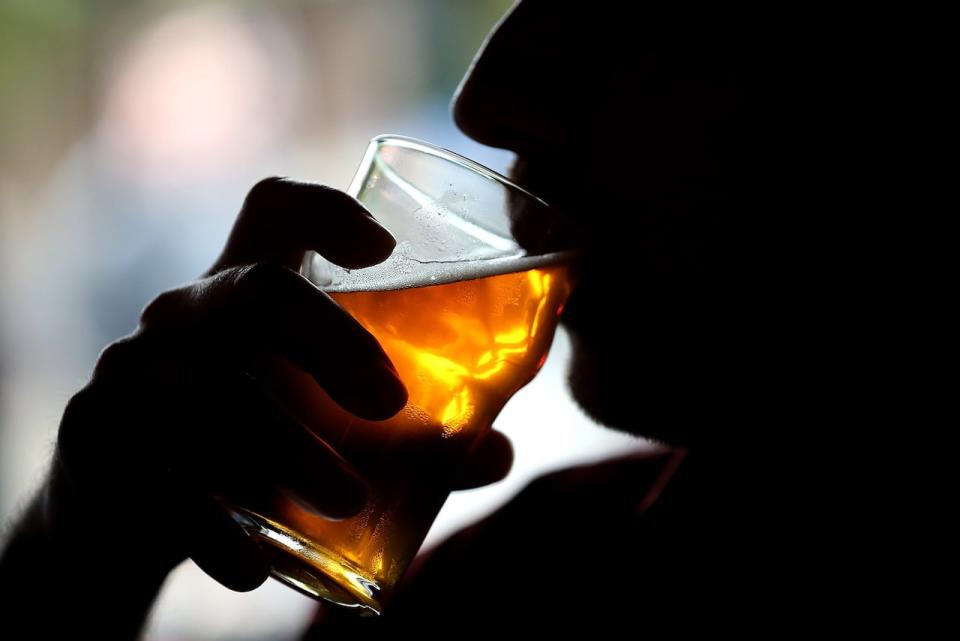
Dr. Tim Naimi, a physician and director of the Canadian Institute for Substance Use Research at the University of Victoria, says it's clear that overall alcohol consumption increased during the pandemic (Justin Sullivan/Getty Images)
People were able to get alcohol delivered directly to their home, or pick it up at a curb.
During the early days of the pandemic in Saskatchewan, restaurants and taverns were temporarily authorized to sell alcohol for delivery and takeout, beginning when they were closed to dine-in customers and also when their dine-in capacity was restricted due to public health restrictions.
Naimi said that, for the most part, these relaxed policies have continued. He said when it comes to drinking habits, there are three things that matter: the price, the availability, and the social acceptance or the normalization of drinking.
In a statement to CBC, the province said it now allows alcohol to be sold for takeout and delivery as part of a food order from a restaurant on a permanent basis.
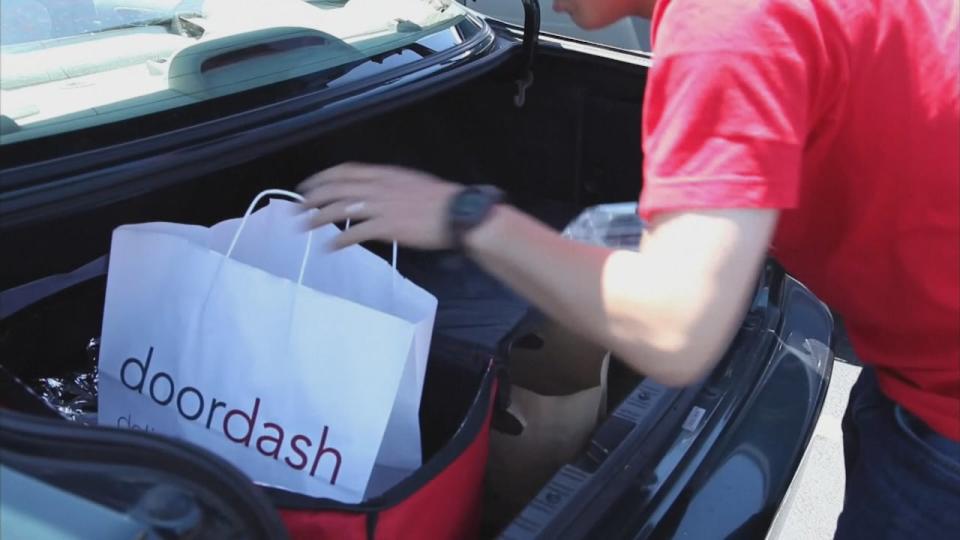
Experts say access to alcohol increased during the pandemic. Many ordered alcohol through delivery apps like DoorDash and SkipTheDishes. (CBC News)
During the pandemic much of Canada saw an increase in the availability of alcohol delivery on delivery apps.
In 2022, for example, food delivery app SkipTheDishes extended its alcohol delivery service to Saskatchewan, which at that time featured 60 alcohol vendors and restaurant partners across the province.
"Never in most places in Canada has it been so easy to get alcohol so many days of the week, so many hours of the day, by so many different means," said Naimi.
Naimi said Canada has a strong problematic drinking culture, and provincial and federal levels of government need to take the harmful repercussions of that culture seriously by revisiting alcohol pricing, taxation, availability and marketing.
"I think in terms of alcohol that the major lasting negative legacy of the pandemic will be the relaxed policies. In many ways industry got a 20-year wish list of all the rollbacks policies that they've been waiting for."


